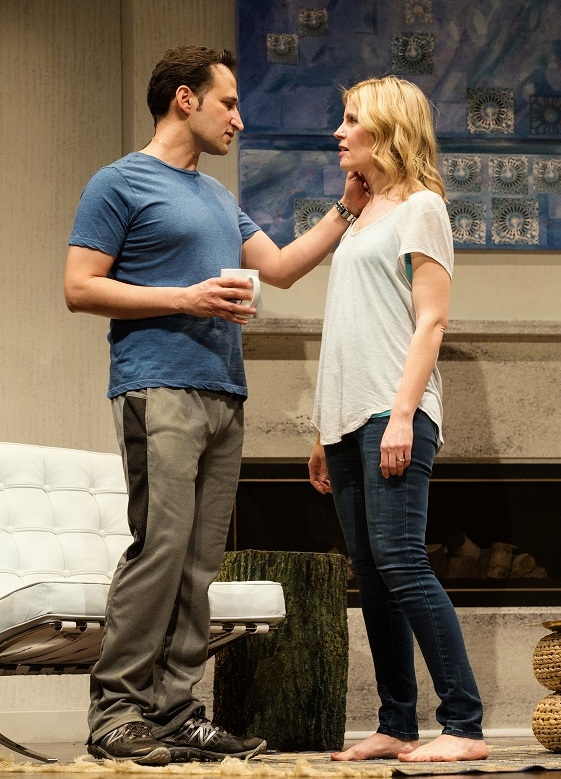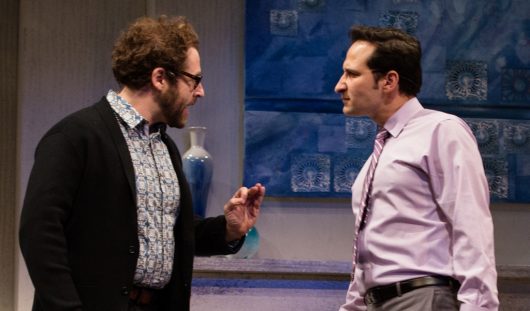Dinner party implodes in powerful Disgraced
Posted on January 27, 2017 By Colin MacLean Entertainment, Front Slider, news, Theatre
 Ayad Akhtar’s Pulitzer Prize-winning play Disgraced is a worthy member of a theatrical sub-genre that might be described as the “imploding dinner party.” A group of people gather in a living room for an evening of civil conversation, there are already tensions in the air when the evening starts and everything goes south from there.
Ayad Akhtar’s Pulitzer Prize-winning play Disgraced is a worthy member of a theatrical sub-genre that might be described as the “imploding dinner party.” A group of people gather in a living room for an evening of civil conversation, there are already tensions in the air when the evening starts and everything goes south from there.
Regular Citadel Theatre patrons may be reminded of such productions as God of Carnage, Other Desert Cities or even the grandfather (grandmother?) of them all, Who’s Afraid of Virginia Woolf?
Disgraced plays on the Shoctor Stage until Feb. 12.
The play is a deft, probing and highly dramatic examination of today’s hot topics – politics, sex, racism, religion, identity, faith, ethnic profiling and how far you must go to renounce, or at least hide, your cultural identity to gain mainstream acceptance. The play premiered on Broadway in 2012, but these are topics made even more current by the results of the recent American election.
Amir Kapoor (Raoul Bhaneja) is deep into the American dream, a hard driving Master of the Universe in his sumptuous but discretely tasteful Manhattan apartment. He is a U.S.-born Muslim-raised Mergers and Acquisitions specialist in a Jewish law firm. He feels the Islam of his childhood is a “backward way of thinking and being” and has supplanted it with a belief in American capitalism. As a one-time public defender, he has been grudgingly enlisted to consult on a case to defend an American Imam who is accused of helping Hamas. He’s not happy with the idea – and neither is his staunchly Jewish firm. His ordered life begins to unravel.
Amir’s attractive WASPish wife Emily (Birgitte Solem) is a painter who is entranced by the historic and expressive art of the East. While exploring the Islamic culture she has come to appreciate the “beauty and wisdom of the Islamic tradition,” and has taken to questioning her husband’s new-found philosophical and moral attitudes.
Joining them for an intimate supper are Jory (Karen Glave), an African-American woman who is a prized, upwardly mobile newcomer (and therefore a competitor) in Amir’s legal firm; and her husband Isaac (Michael Rubenfeld), a non-practicing Jew and an art curator interested in mounting Emily’s work in a big New York Gallery.
 After a few glasses of expensive Scotch, and over a fennel salad, talk turns to the very issues we are told to never bring up in polite conversation. The slow simmer of the evening explodes into a full boil. Amir, the apostate, when pushed, finds his long-buried beliefs emerging. Isaac, with little knowledge of what he is talking about, mouths the commonly accepted “truths” about Islam and the Qur’an. Amir may have referred to the Qur’an as “one very long hate mail letter to humanity,” but bristles when Isaac expresses an opinion about the differences between Islam and Islamic fascism – even to admitting to an unexpected “blush of pride” in the success of the 9/11 attacks. A fierce debate develops, to say the least.
After a few glasses of expensive Scotch, and over a fennel salad, talk turns to the very issues we are told to never bring up in polite conversation. The slow simmer of the evening explodes into a full boil. Amir, the apostate, when pushed, finds his long-buried beliefs emerging. Isaac, with little knowledge of what he is talking about, mouths the commonly accepted “truths” about Islam and the Qur’an. Amir may have referred to the Qur’an as “one very long hate mail letter to humanity,” but bristles when Isaac expresses an opinion about the differences between Islam and Islamic fascism – even to admitting to an unexpected “blush of pride” in the success of the 9/11 attacks. A fierce debate develops, to say the least.
Director Robert Ross Parker keeps the emotions down and very natural at the beginning – but the canny helmsman is saving the big sound for the big emotions to come. When they do they are impressive indeed. He moves his people fluidly around the stage – there is none of the grand theatrical gesture here. The characters of a Black, Jew, WASP and a Muslim might be regarded as a set-up for political discussion, but cast and director conspire to keep it real. Also the playwright has strewn quite a bit of humour into his verbal fireworks, and the company subtly makes full use of it.
Bhaneja skilfully projects a conflicted character never quite sure of his place in the world. He seems as surprised as we are at the depths of his long-buried passions. The play suggests we never leave behind the beliefs of our childhood no matter how hard we try. If Bhaneja wasn’t so good, Rubenfeld would run off with the show. The actor first comes across as a post-Woody Allen, with his rumpled manner, indoor scarf, horn-rim glasses and longish hair with pretensions, but he has entrenched positions and biases of his own. He also generates considerable sympathy for a character who otherwise might be something of a caricature.
Solem and Glave are less spelled out but both are superb performers and hold the evening together when it threatens to fly apart.
Rounding out the cast is Gabe Grey as Abe, a young Muslim just finding his way. His disheartening experience as the subject of an FBI sting profoundly affected his attitudes toward being an American, and contribute to the melancholy mood – both on a global and personal level.
Disgraced bristles with wit, ideas and intelligence. Akhtar’s dramatic approach and his smart, spare dialogue packed into an intermissionless 90 minutes demonstrate that theatre is an excellent platform for exposing the delusion that America is a post-racial nation.
There are no easy answers in the play. You’ll carry it with you on the way home.
Photos by Cylla von Tiedemann











